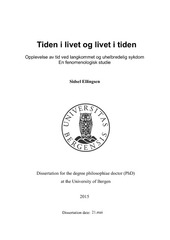Tiden i livet og livet i tiden. Opplevelse av tid ved langkommet og uhelbredelig sykdom. En fenomenologisk studie
Doctoral thesis
Permanent lenke
https://hdl.handle.net/1956/9915Utgivelsesdato
2015-05-21Metadata
Vis full innførselSamlinger
Sammendrag
The aim of this project was to gain insight in the lived experience of time when living with severe incurable disease and receiving palliative care at home or at different palliative care settings in Norway. The study is descriptive and based on a phenomenological life world perspective. It is conducted 26 in-depth interviews with 23 respondents, 14 females and 9 males, aged 42-88 years during the period: April 2008 to February 2010. The analysis in the first and second article is inspired by A. Giorgis phenomenological descriptive method while the analysis in the third article is inspired by K. Martinsen deciphering and phenomenological approach. As bodily weakness progresses and change the opportunity to participate in activities of daily living the existential meaning of time becomes prominent, while the clock time gradually loses its importance. When living with a deteriorated body in unpredictable change it becomes increasingly challenging to relate punctual to the time. The lived experience of time is described as a movement that goes, where the perception of how fast it goes depends on the tuned life situation of the individual, of what happens at the place where one is situated, the structure and atmosphere at the place and if one finds the tone and rhythm in the relationship with the other. Typically, the time is experienced to go fast, but it can also be the opposite. The quality of time appears in ambiguous ways, in different but integrated levels and dimensions and in the light of its opposite. The most significant for the quality of time, is whether the suffering is alleviated or not, if one feels safe or unsafe on site, and if one feels at home or homeless in existence. Findings are discussed in relation to phenomenological philosophy, Saunders hospice philosophy and Martinsens care philosophy. Målet med prosjektet var å få innsikt i hvordan pasienter som mottar palliativ omsorg opplever tidens mangfold ut fra sin livssituasjon som alvorlig og uhelbredelig syk. Studien er beskrivende og inspirert av et fenomenologisk livsverdensperspektiv. Det er foretatt 26 dybdeintervju med 23 respondenter, 14 kvinner og 9 menn, i alderen 42- 88 år i tidsrommet: april 2009 – februar 2010. Analysen har vært en prosess som har endret seg underveis. Analysen i artikkel en og to er inspirert av Giorgis fenomenologiske beskrivende metode, mens analysen i artikkel tre er inspirert av K. Martinsens tydende og fenomenologiske tilnærming. Ved alvorlig livstruende sykdom endres livsverden og forholdet til tid. I takt med kroppslig svekkelse og endring i hva en kan gjøre, fremtrer livet som tidens egentlige mening mens klokketiden mister betydning. Med en kropp i uforutsigbar endring blir det stadig mer utfordrende å forholde seg punktlig til tidspunkt. Tid blir beskrevet som en bevegelse som går, hvor opplevelsen av hastigheten på hvor fort tiden går avhenger av livssituasjonen til den enkelte, av det som skjer på stedet der en er, stedets struktur og atmosfære og om en finner tonen og rytmen i relasjon med den andre. Det typiske er at tiden oppleves å gå fort, men det kan også være motsatt. Kvalitet på tiden fremstår på flertydig vis og i ulike, men integrerte nivå og dimensjoner, og i lys av sin motsetning. Det mest betydningsfulle for hvordan tiden erfares når pasienten er alvorlig og livstruende syk, er om en får lindret det som plager, om en føler seg trygg eller utrygg på stedet en er, og om en føler seg hjemme eller hjemløs i egen tilværelse. Studiens funn blir belyst i forhold til fenomenologisk filosofiske utlegginger om tid, Saunders hospicefilosofi og Martinsens omsorgsfilosofi.
Består av
Paper I: Ellingsen, S., Roxberg, Å., Kristoffersen, K., Rosland JH. & Alvsvåg, H. 2013. Entering a world with no future. A phenomenological study describing the embodied experience of time when living with severe incurable disease. Scandinavian Journal of Caring Science. 27(1):165-74. The article is available at: http://hdl.handle.net/1956/10125Paper II: Ellingsen, S., Roxberg, Å., Kristoffersen, K., Rosland JH. & Alvsvåg, H. 2014. Being in transit and in transition. The experience of time at the place, when living with severe incurable disease – a phenomenological study. Scandinavian Journal of Caring Science. 28(3):458-68. The article is available at: http://hdl.handle.net/1956/10127
Paper III: Ellingsen, S., Roxberg, Å., Kristoffersen, K., Rosland JH. & Alvsvåg, H. 2015. The pendulum time of life. The experience of time, when living with severe incurable disease – a phenomenological and philosophical study. Medicine, Health Care and Philosophy. 18(2): 203-215. The article is available at: http://hdl.handle.net/1956/10455
